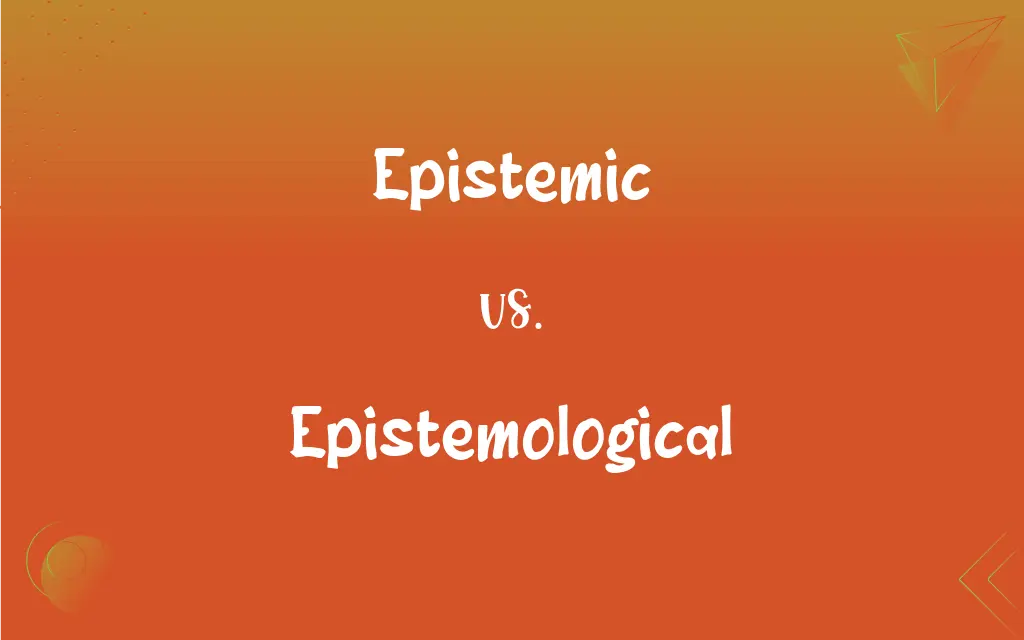Epistemic vs. Epistemological: What's the Difference?
Edited by Aimie Carlson || By Harlon Moss || Updated on November 13, 2023
Epistemic relates to knowledge or the degree of its validation, while epistemological pertains to the theory of knowledge, especially with regard to its methods, validity, and scope.

Key Differences
Epistemic refers to aspects of knowledge and belief, particularly in terms of justification and truth. Epistemological, however, deals with the study or theory of how we know things, encompassing methodologies and frameworks.
An epistemic claim relates to the nature or state of knowing something, like a belief's credibility. In contrast, an epistemological approach examines the philosophical underpinnings of how knowledge is acquired.
Epistemic can describe a quality of an assertion regarding its knowledge status. Epistemological refers to the study of knowledge systems, including the exploration of skepticism and certainty.
Epistemic concerns are often about the certainty or probability of specific knowledge. Epistemological questions delve into the nature, origin, and limits of human knowledge.
The term epistemic can be applied to practical scenarios involving knowledge claims. Epistemological is used in academic and philosophical discussions about the theory of knowledge itself.
ADVERTISEMENT
Comparison Chart
Focus
On knowledge itself and its validation.
On the study or theory of knowledge.
Usage
In describing beliefs or knowledge claims.
In discussing the philosophy of knowledge.
Scope
Specific to knowledge instances.
Broad, encompassing the entire field.
Relation to Knowledge
Directly relates to knowledge's validity.
Concerns the methodology of acquiring knowledge.
Context of Application
Often in practical, everyday scenarios.
Primarily in philosophical or academic contexts.
ADVERTISEMENT
Epistemic and Epistemological Definitions
Epistemic
Pertaining to the degree of belief or justification.
Her argument had strong epistemic grounds.
Epistemological
Pertaining to the theory or philosophy of knowledge.
His research took an epistemological perspective on history.
Epistemic
Relating to knowledge or its validation.
The epistemic certainty of his theory was questionable.
Epistemological
Relating to the study of knowledge's nature and scope.
The epistemological debate centered on the limits of human understanding.
Epistemic
Involving the assessment of knowledge claims.
The epistemic status of the hypothesis was unclear.
Epistemological
Involving the analysis of knowledge systems and theories.
She offered an epistemological critique of the scientific method.
Epistemic
Referring to the criteria for knowledge and truth.
Epistemic justification is essential for scientific inquiry.
Epistemological
Concerning the methods of acquiring and validating knowledge.
The seminar explored different epistemological approaches.
Epistemic
Concerned with the nature of knowledge and belief.
He made an epistemic distinction between belief and knowledge.
Epistemological
Referring to the philosophical examination of truth.
The epistemological question of what constitutes truth remains complex.
Epistemic
Of, relating to, or involving knowledge; cognitive.
Epistemological
The branch of philosophy that examines the nature of knowledge, its presuppositions and foundations, and its extent and validity.
Epistemic
Of or relating to knowledge or cognition; cognitive.
Epistemological
Of or pertaining to epistemology or theory of knowledge, as a field of study.
Epistemic
Of or relating to the metaknowledge and theory of knowledge (epistemology).
Epistemological
Of or pertaining to knowing or cognizing, as a mental activity.
Epistemic
Of or pertaining to epistemology; as, epistemic modal.
Epistemological
Of or relating to epistemology;
Epistemic modal
Epistemic
Of or relating to epistemology;
Epistemic modal
FAQs
Are epistemic concerns practical?
Often, especially in everyday knowledge claims.
Is epistemological about studying knowledge?
Yes, it's about how knowledge is acquired and understood.
Can epistemic refer to belief?
Yes, especially regarding its justification.
What does epistemic mean?
It relates to knowledge or its validation.
Is epistemological theory abstract?
Generally, it involves abstract philosophical concepts.
Can something be both epistemic and epistemological?
Yes, especially in contexts involving knowledge theory.
How do scientists use epistemic concepts?
To assess the validity and certainty of their findings.
Do philosophers focus on epistemological issues?
Yes, particularly in the field of theory of knowledge.
What role does epistemology play in research?
It guides the methodologies and validation of knowledge.
How does epistemic differ from empirical?
Epistemic is about knowledge theory, while empirical is about data and observation.
What does epistemological mean?
It pertains to the theory or philosophy of knowledge.
Is epistemological analysis common in academia?
Yes, especially in philosophy and social sciences.
Can epistemic refer to uncertainty?
Yes, it often deals with degrees of certainty and doubt.
Do all fields of study have epistemological aspects?
Yes, in the way they conceptualize and validate knowledge.
Can one's epistemic stance change?
Yes, with new information or insights.
What is an epistemic community?
A group sharing common knowledge and beliefs.
Can epistemic validity be quantified?
It's challenging, as it often involves subjective judgment.
Are epistemological questions always philosophical?
Mostly, but they can have practical implications too.
Does epistemic involve ethical considerations?
Sometimes, particularly in the justification of beliefs.
How is epistemological understanding beneficial?
It aids in comprehending the foundations and limits of knowledge.
About Author
Written by
Harlon MossHarlon is a seasoned quality moderator and accomplished content writer for Difference Wiki. An alumnus of the prestigious University of California, he earned his degree in Computer Science. Leveraging his academic background, Harlon brings a meticulous and informed perspective to his work, ensuring content accuracy and excellence.
Edited by
Aimie CarlsonAimie Carlson, holding a master's degree in English literature, is a fervent English language enthusiast. She lends her writing talents to Difference Wiki, a prominent website that specializes in comparisons, offering readers insightful analyses that both captivate and inform.
































































